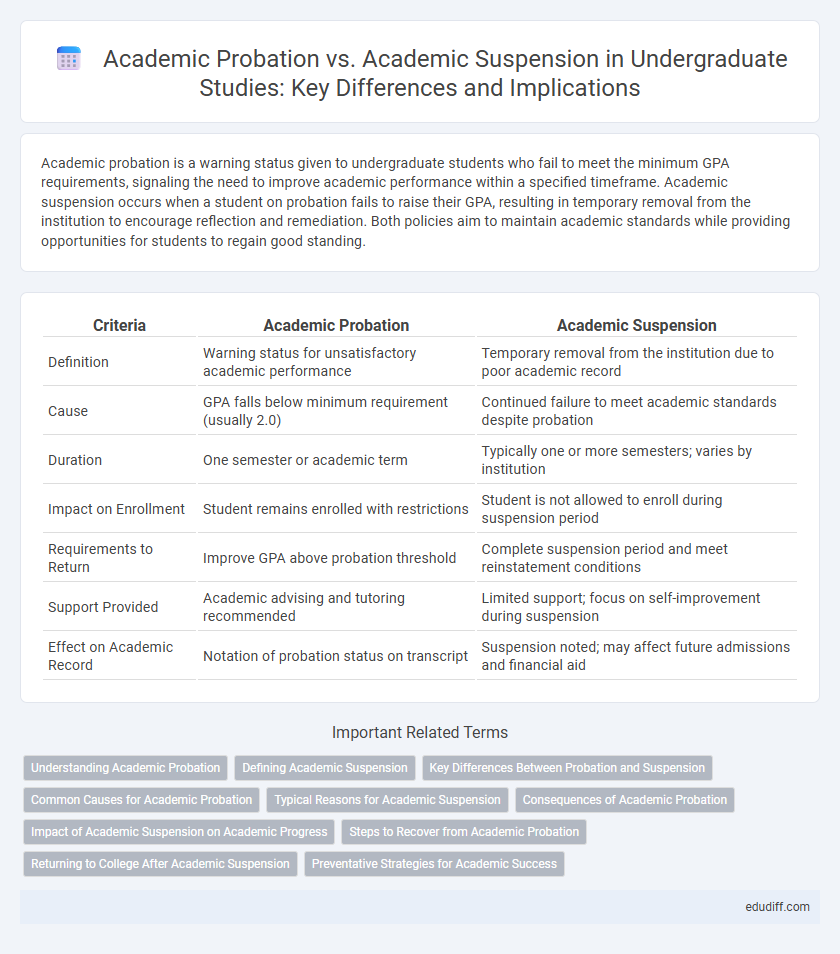Academic probation is a warning status given to undergraduate students who fail to meet the minimum GPA requirements, signaling the need to improve academic performance within a specified timeframe. Academic suspension occurs when a student on probation fails to raise their GPA, resulting in temporary removal from the institution to encourage reflection and remediation. Both policies aim to maintain academic standards while providing opportunities for students to regain good standing.
Table of Comparison
| Criteria | Academic Probation | Academic Suspension |
|---|---|---|
| Definition | Warning status for unsatisfactory academic performance | Temporary removal from the institution due to poor academic record |
| Cause | GPA falls below minimum requirement (usually 2.0) | Continued failure to meet academic standards despite probation |
| Duration | One semester or academic term | Typically one or more semesters; varies by institution |
| Impact on Enrollment | Student remains enrolled with restrictions | Student is not allowed to enroll during suspension period |
| Requirements to Return | Improve GPA above probation threshold | Complete suspension period and meet reinstatement conditions |
| Support Provided | Academic advising and tutoring recommended | Limited support; focus on self-improvement during suspension |
| Effect on Academic Record | Notation of probation status on transcript | Suspension noted; may affect future admissions and financial aid |
Understanding Academic Probation
Academic probation is a status given to undergraduate students whose academic performance falls below the institution's minimum GPA requirements, signaling the need for immediate improvement to avoid further penalties. This measure allows students a probationary period to raise their grades and maintain enrollment while providing access to academic support services such as tutoring and counseling. Understanding the specific GPA thresholds, probation duration, and required corrective actions is essential for students to successfully navigate academic probation and prevent academic suspension.
Defining Academic Suspension
Academic suspension is a serious disciplinary action taken by universities when an undergraduate student's academic performance falls significantly below the institution's minimum standards, often after repeated probation violations. This suspension typically requires the student to leave the university for a specified period, ranging from one semester to an entire academic year, before reapplying for readmission. The goal of academic suspension is to encourage students to reflect on their academic challenges and develop strategies to improve their future performance.
Key Differences Between Probation and Suspension
Academic probation occurs when a student's GPA falls below the institution's required minimum, serving as a warning to improve performance without immediate removal from classes. Academic suspension is a more severe consequence involving temporary removal from the institution due to continued poor academic performance or failure to meet probation terms. Probation allows students to continue their studies under closer monitoring, while suspension restricts their enrollment until they meet specific reinstatement criteria.
Common Causes for Academic Probation
Common causes for academic probation include consistently low GPA, failure to meet minimum credit requirements, and poor attendance in core courses. Students on academic probation often struggle with time management, insufficient study habits, and lack of engagement with academic resources. Addressing these issues early can prevent escalation to academic suspension, which results from continued academic underperformance.
Typical Reasons for Academic Suspension
Typical reasons for academic suspension include consistently low GPA below the institution's minimum requirement, failure to meet credit completion thresholds, and repeated academic dishonesty violations. Students placed on academic suspension often have not improved their academic performance after probation, indicating serious challenges in maintaining satisfactory progress. Institutions use suspension as a formal measure to encourage students to take time off and address underlying issues before resuming their studies.
Consequences of Academic Probation
Academic probation in undergraduate studies results in restricted enrollment options, mandatory meetings with academic advisors, and the requirement to improve GPA within a specified timeframe. Students on probation may lose eligibility for scholarships, campus housing, or extracurricular activities, impacting their overall college experience. Failure to meet probation terms often leads to academic suspension, which temporarily bars students from attending classes.
Impact of Academic Suspension on Academic Progress
Academic suspension halts a student's enrollment entirely, severely disrupting their academic progress by requiring a mandatory break from coursework and delaying degree completion. This interruption can result in loss of financial aid eligibility and diminished access to campus resources, further impacting academic momentum. Students often face challenges in re-admission processes and must demonstrate improved academic performance before resuming studies.
Steps to Recover from Academic Probation
Students on academic probation must first understand their institution's specific requirements to improve their GPA, such as completing a minimum number of credit hours with a set grade average. Developing a structured academic plan with advisors, including tutoring and time management strategies, significantly aids in meeting these benchmarks. Consistently monitoring progress and meeting with academic support services ensures compliance with probation terms and prevents suspension.
Returning to College After Academic Suspension
Academic probation is a warning status given when a student's GPA falls below the institution's minimum requirement, while academic suspension is a temporary dismissal from the college due to continued poor academic performance. Returning to college after academic suspension typically requires meeting specific readmission criteria, such as improving academic skills, completing coursework elsewhere, or submitting a detailed reinstatement plan. Students who successfully return after suspension often benefit from academic advising, tutoring services, and personalized support programs designed to enhance their academic success and prevent future probation or suspension.
Preventative Strategies for Academic Success
Academic probation typically serves as an early warning system when a student's GPA falls below the institution's minimum requirement, while academic suspension involves a temporary removal from the university due to sustained poor performance. Preventative strategies for academic success include utilizing campus resources such as tutoring centers, academic advising, and time management workshops to improve study habits and course comprehension. Regular progress monitoring and proactive communication with professors help address challenges before reaching probation or suspension thresholds.
Academic Probation vs Academic Suspension Infographic

 edudiff.com
edudiff.com